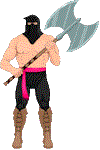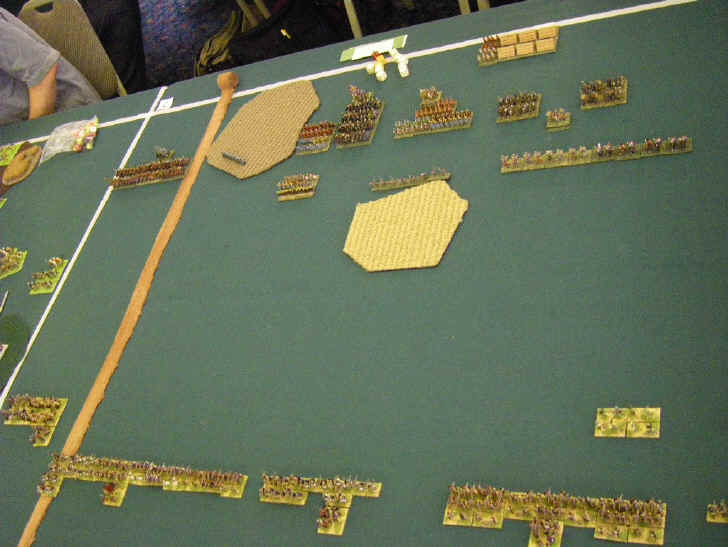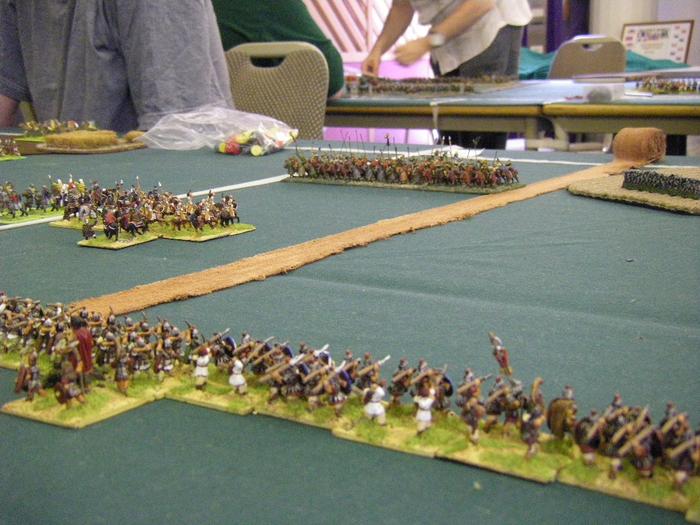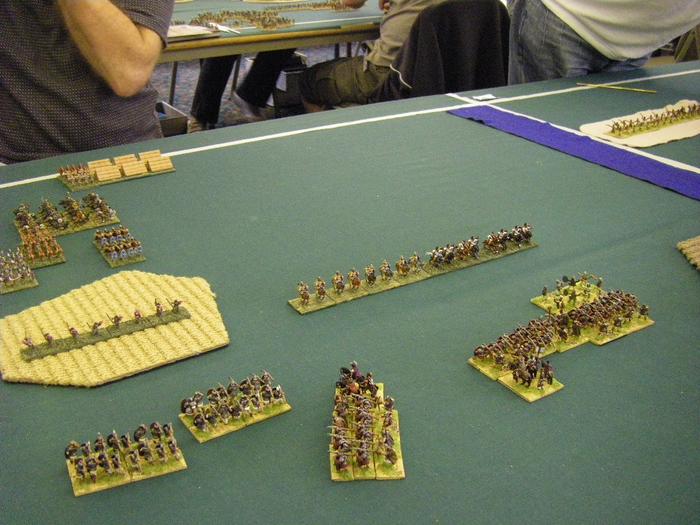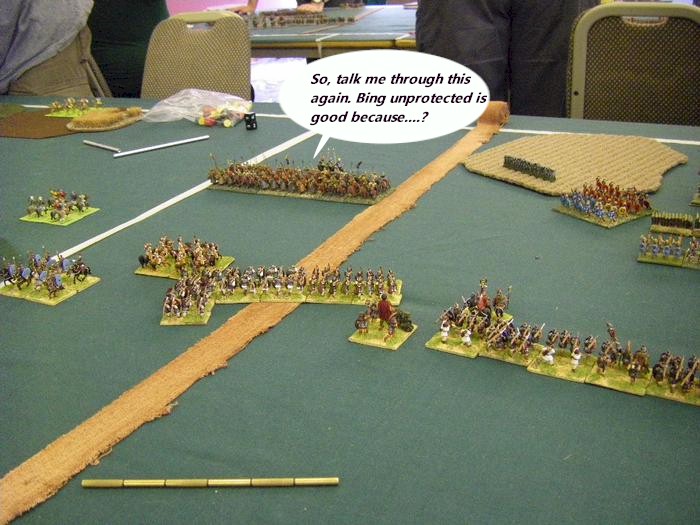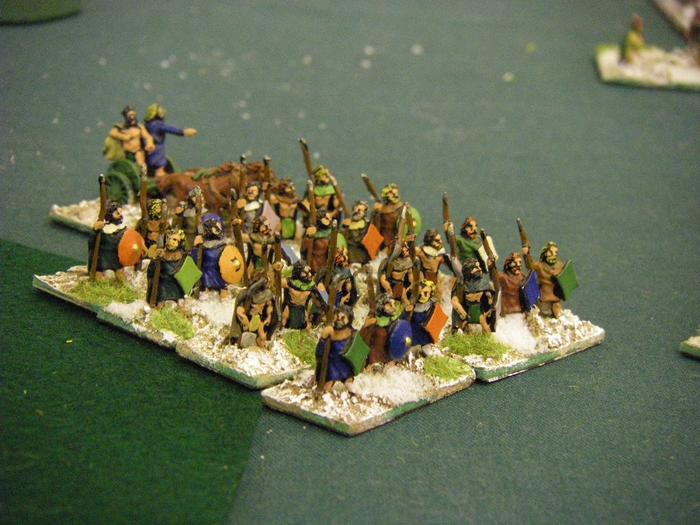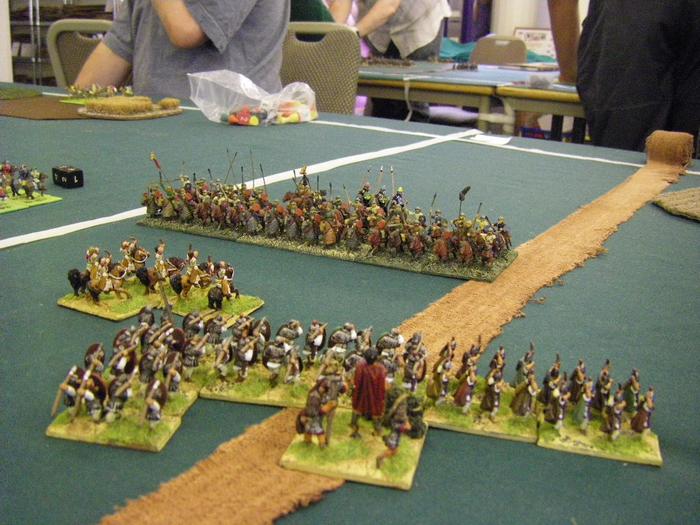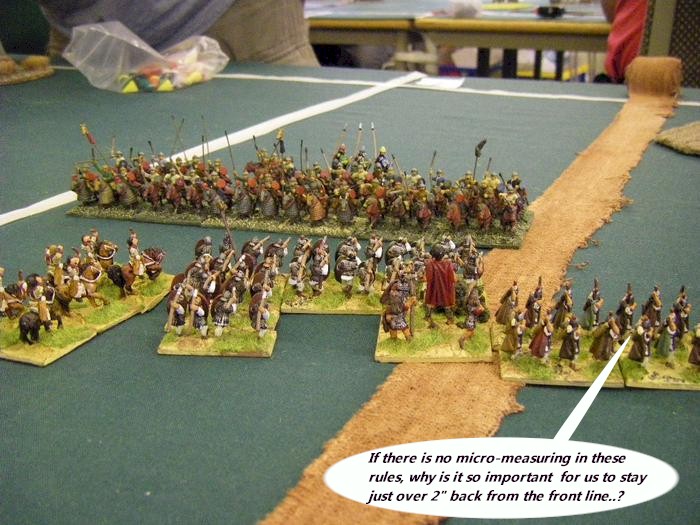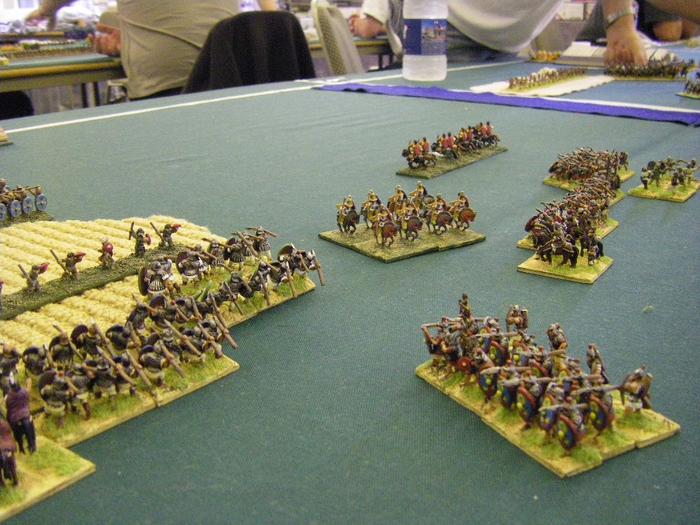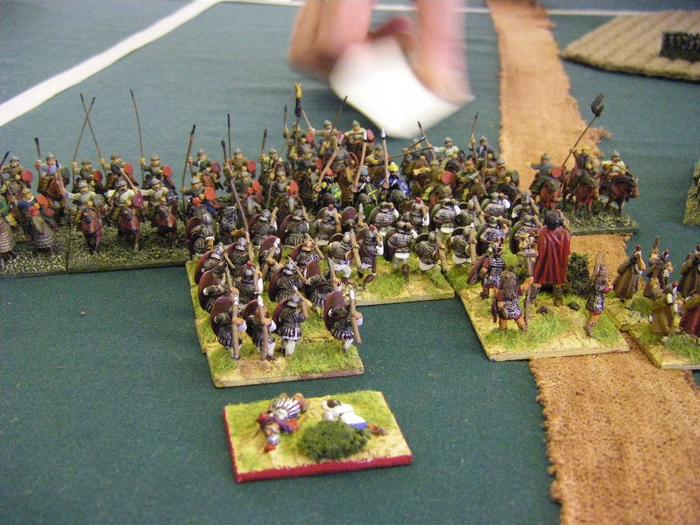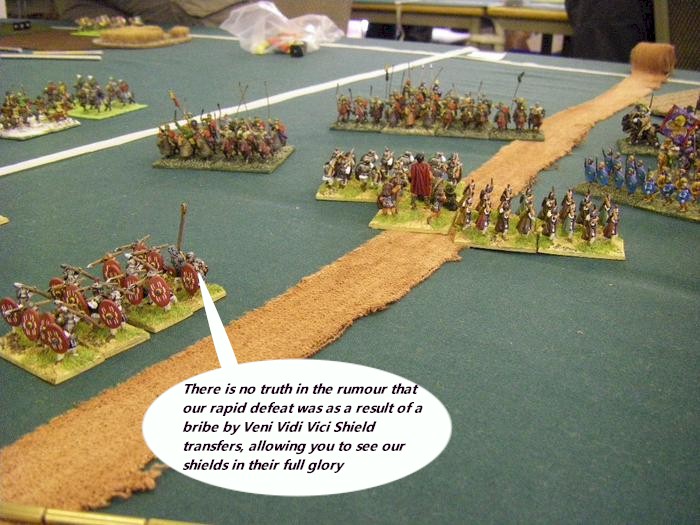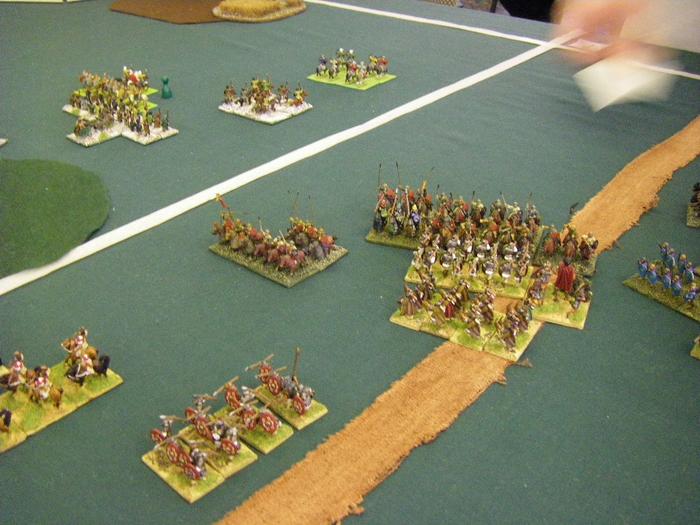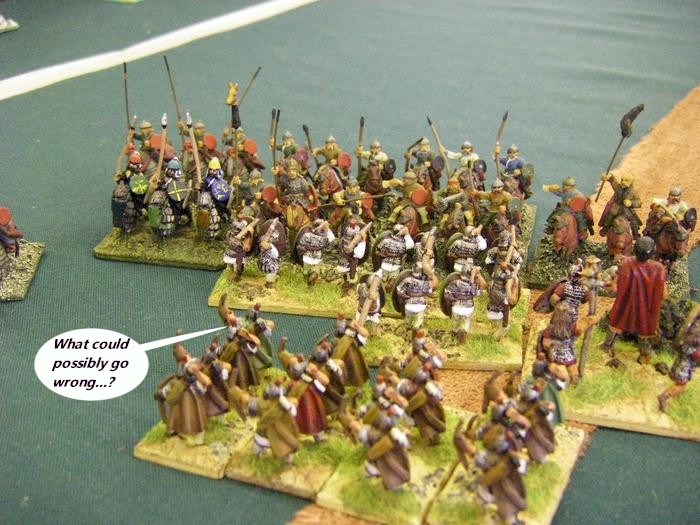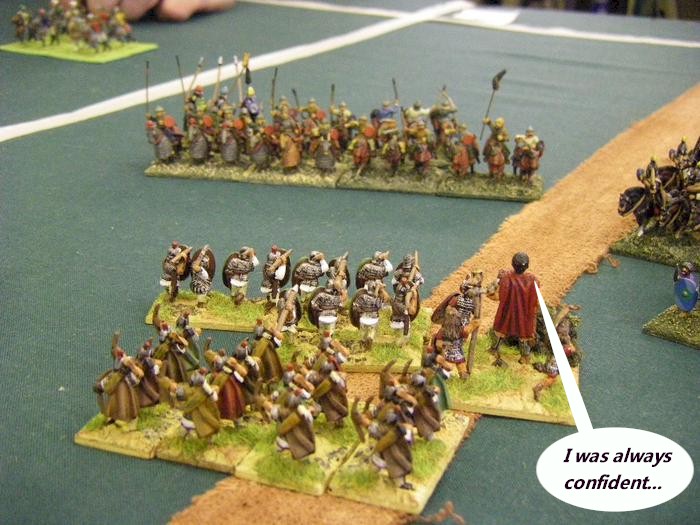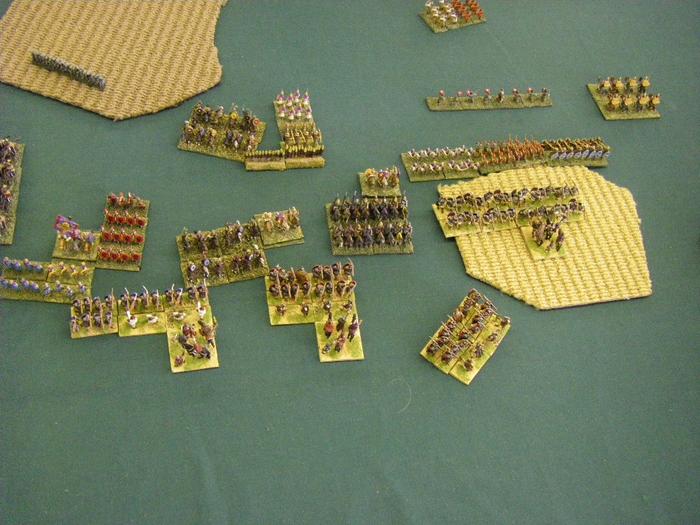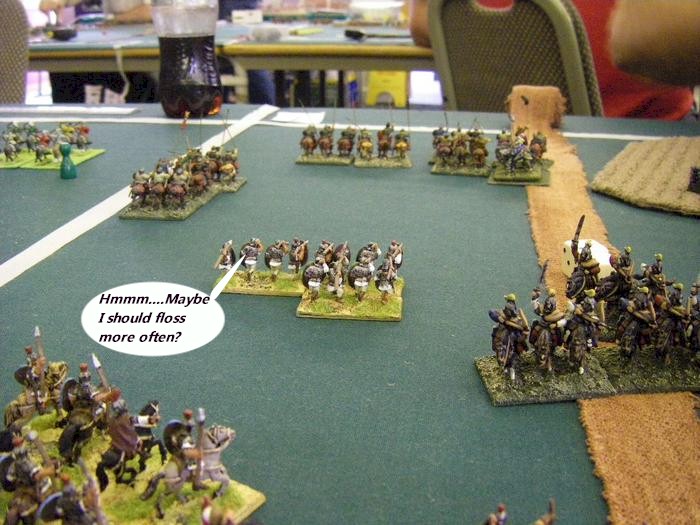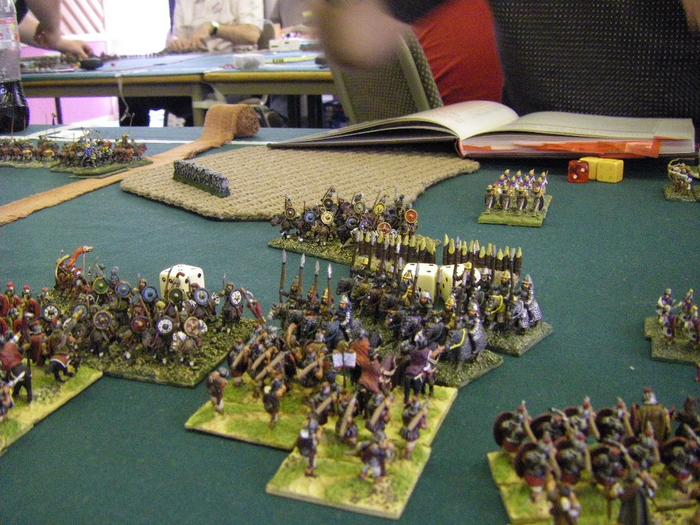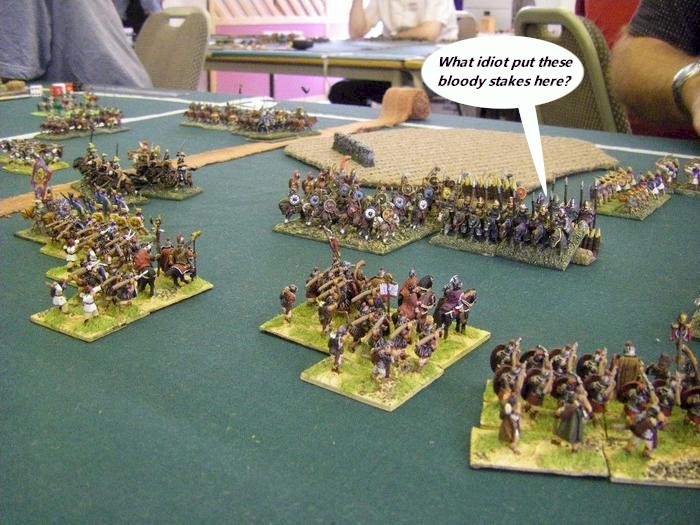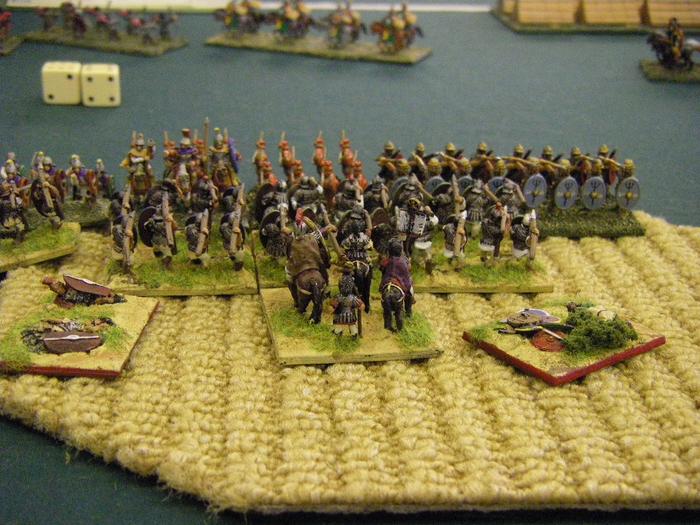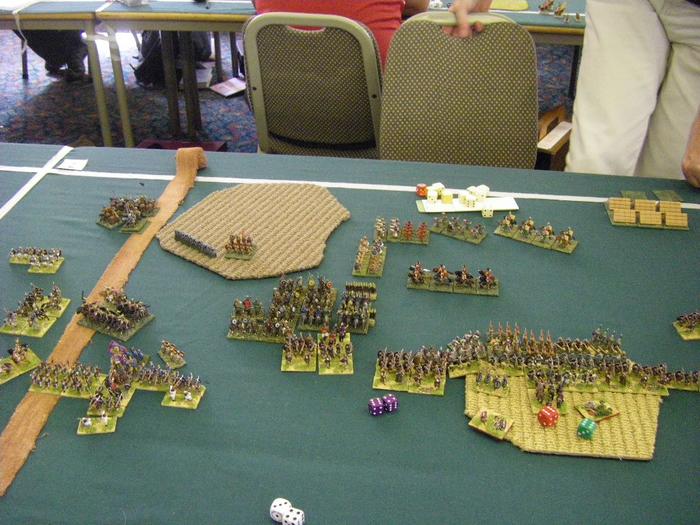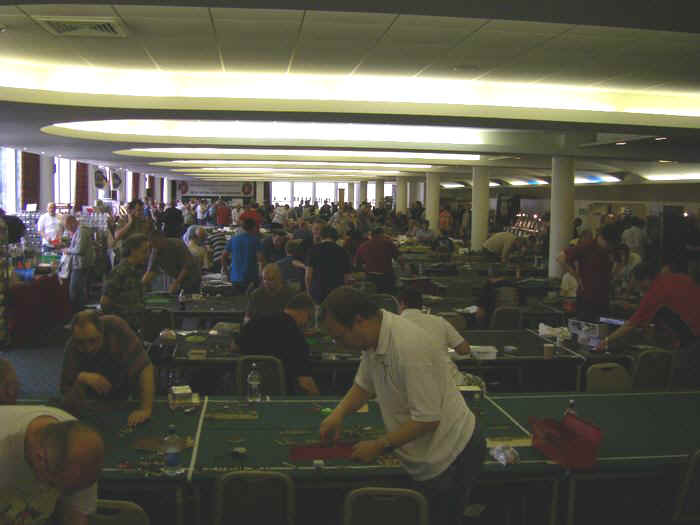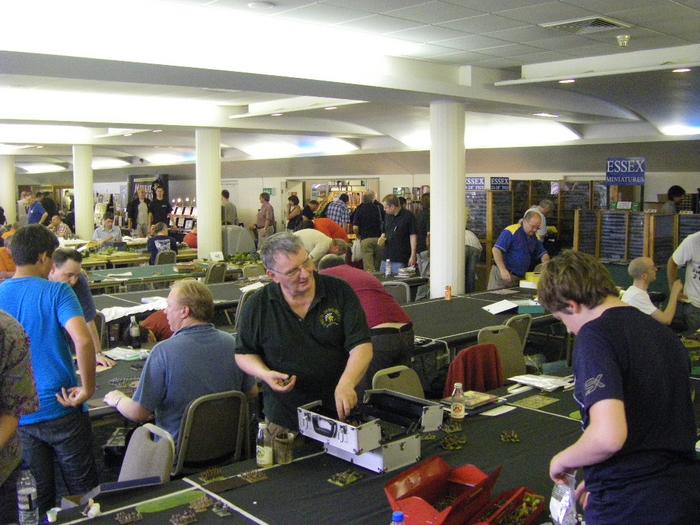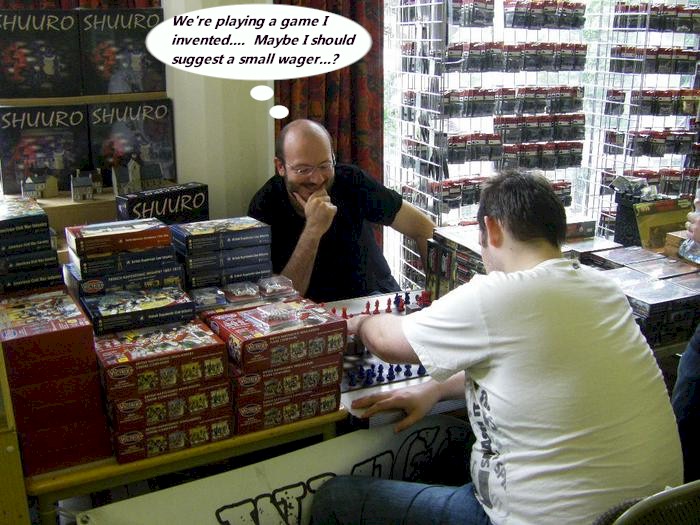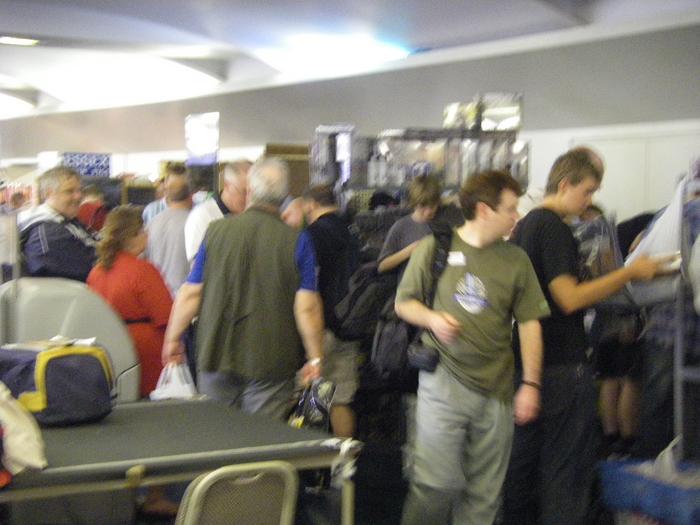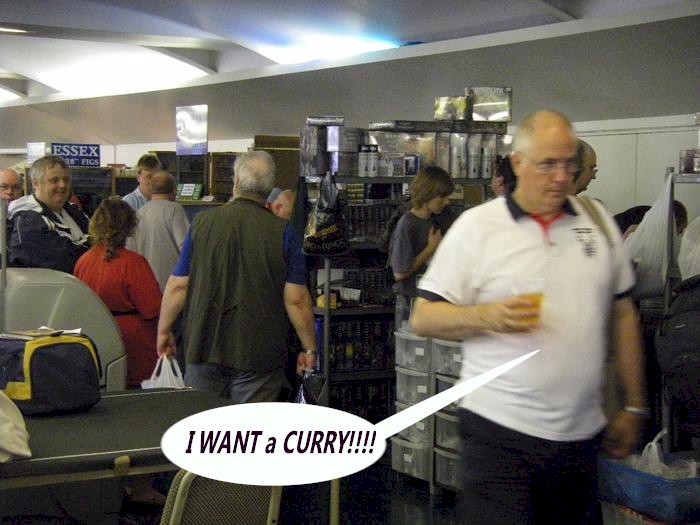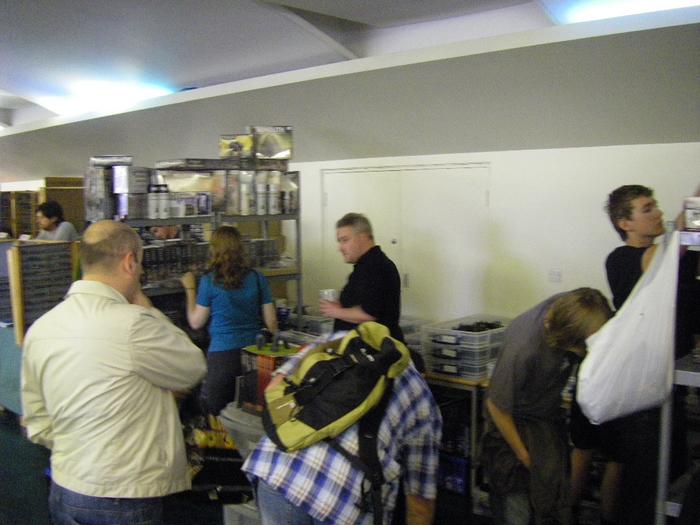Field of Glory Wargaming at Britcon 2009 - Sunny Manchester 2009
As the second day dawned, I found my teeney tiny Roman army facing yet more Romans - this time it was a Foederate Roman army. The list is available here
Pictures of Romans from my Ancients Photo Directory
The astonishing Foederate Roman army was even bigger than mine, with loads of small blocks of cavalry, bizarrely a lot of it unarmored. Protected auxilia and cataphracts massed in the middle, and a line of skirmishing light horse on my right completed the set. With a largely bald table, I struggled to spread m army across the board. Yet again a Civil War looked set to start.
The game started as my Roman LH swiftly moved to get in some early shooting on the unprotected mass of allied (yes, allied) bow/sword cavalry.
On my right both sides were trying to avoid combat, with first the Foederate Roman cavalry moving across to the left, swiftly followed by my legions, leaving some auxilia and legionaries to contest the field from enemy LH. My auxilia were off and running to try and bottle the enemy up before they could even get into the Rough Going of a ploughed field in the middle.
After a few rounds of ineffective shooting my light horse fell back to be replaced by fast moving but somewhat brittle auxilia. Medium foot, but armoured - how would they stand against the enemy cavalry? And would my unprotected, but superior bowmen prove to be a liability or an asset?
Elsewhere, on an adjacent table, I took a photo of some nice Picts advancing through the snow.
The Foederate horse were doing their damnedest to drive off the Dominate light horse, but were starting to come in for some heavy shelling,. Caesar himself, sensing a decisive moment approaching, had moved across to lend his arrowproof umbrella to his auxilia.
As the gap between the two lines approached, the auxilia stepped forward beyond their supporting archers - so far that the enemy would not be able to step forward into contact with the vulnerable bowmen.
Elsewhere, my other auxilia had made it into the field in the middle of the park, but our slow moving infantry were still slowly pushing back the Foederate light horse.
As the Dominate auxilia moved forward under the steely gaze of Caesar on the left, the Allied cavalry charged in - and immediately caused grave and serious injuries to one of the auxiliary units, who had foolishly contracted into a column in order to allow the light horse to escape....
Almost immediately the auxilia broke and fled to be pursued by one of the allied cavalry units and leaving just one unit standing as a bastion against the enemy horsemen. But, led by Caesar, their morale held and the bulk of the allied Roman cavalry had to fall back ready to charge in again.
And as this was happening, the cavalry charged in yet again - risking life and limb the Roman archers moved swiftly and silently behind their auxilia, targeting the soft underbelly of the pursuing unit with devastating fire and providing rear support to their colleagues. If the auxilia unit stood firm, it might be good - but if they faltered it would be catastrophic!
With an almighty clash the two sets of warriors rejoined battle - and this time, an auxilia died. the unit was now teetering on the brink of evaporation!
But they teetered, but their shield wall held as Caesar himself again urged them on! As the enemy cavalry again fell back to regroup in increasing states of disarray and disruption, the archers breathed a sign of relief...
As this great drama was happening another wave of attacks was being triggered in the middle of the park. But this time the opponents for the Foederate cavalry and auxilia were far more resolute Dominate Legions, and in many cases the Foederate generals were trying to hold their men back rather than urge them on.
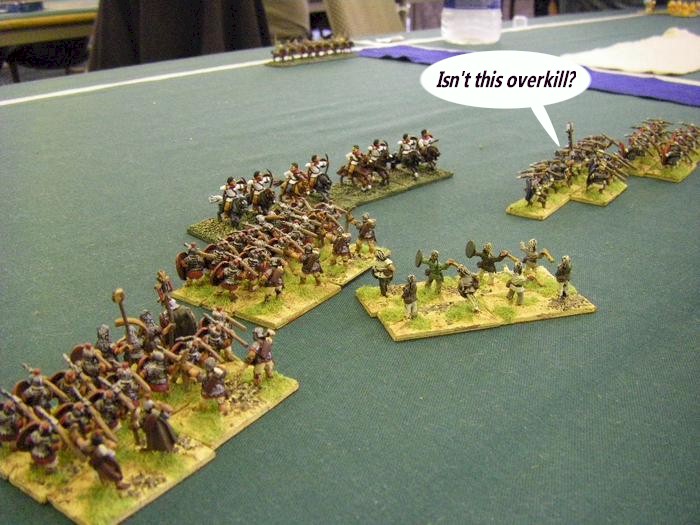
Elsewhere, the Dominates had started to get the better of herding FoG, sorry, Fog, and had the Foederate horse archers on the run.
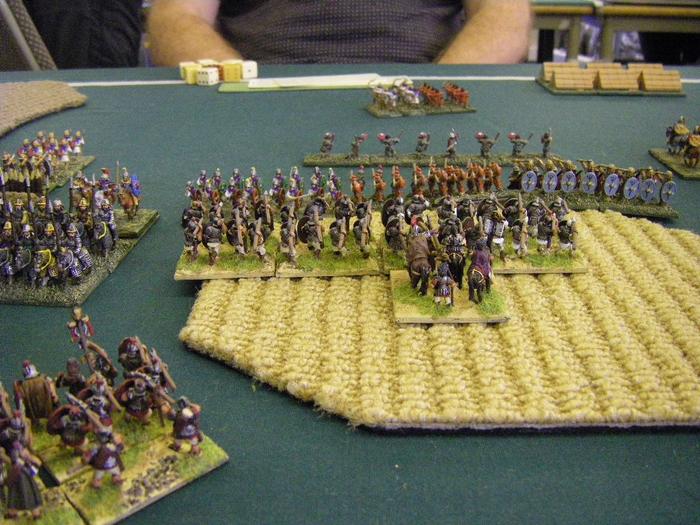
As the situation started to improve across the board, in the middle the
armoured auxilia decided that they too needed to join in if the game was not to
come to a halt before they had gotten involved - and before Caesars legions
could kill enough of the huge Foederate army to win the game. They advanced in
the face of greater numbers.... 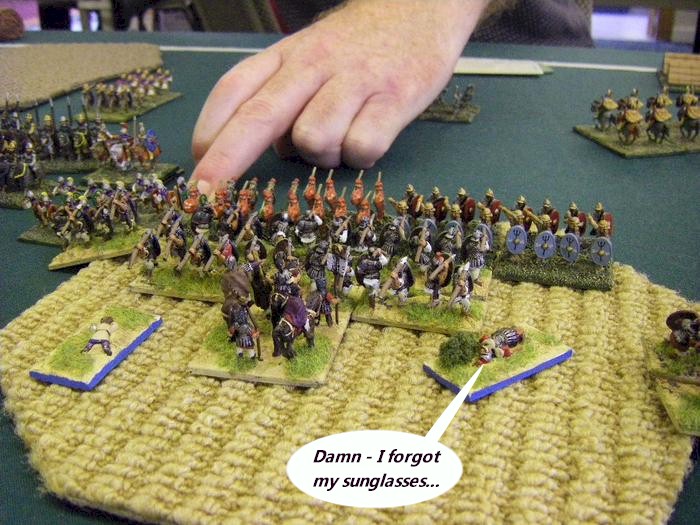
And soon discovered that a 50% advantage in numbers was a lot better than armour.
But elsewhere things had gotten much better. A determined charge and a lot of shooting had suddenly caused a dramatic collapse in the morale of the 3 units of cavalry over on the Foederate right, and the battered unit of auxilia had taken almost total control of the field!!
The same could be said of the prolonged slog in the middle, as the Dominate legions refused to buckle under the blows of the many units of lancer cavalry and cataphracts charging into them.
Soon the Foederates were being thrown back across the middle of the field, and the increasingly confident Dominate legions, all led by generals, were able to follow up their advantage.
The grim spot was in the field, where Dominate auxilia were taking a pasting. They clung on desperately ...
..and at the death one of them was still hanging on for their lives as the rest of the Foederate army slumped to defeat as both their flanks started to cave in ! The Romans won 23-2 !
Other games packing up
Trade stands
Post Match Summary
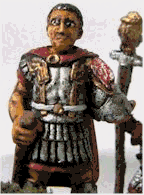 As
Caesar, I'm announcing that here's a turnup for the books - yet another win
eh?
As
Caesar, I'm announcing that here's a turnup for the books - yet another win
eh?
This time at least we beat a Roman army from the tail end of the Empire, so they lost a lot of the land that my boys had held for so long with their sweat and blood - and it showed.
I suspect the Foederate Romans were optimized for facing off a much smaller, or much more Light-horse heavy opponent than us, with our wall-to-wall armoured infantry, and so they did find it difficult to punch a way through our wall of steel.
We did experience a rather iffy moment near the beginning of the game when our auxilia had to tough it out against the enemy cavalry, but thankfully the combination of our armour, and personal intervention from me, the main man, helped my chaps hang on in there against what was always a rather under-generalled allied contingent and once they had started to falter in their resolution it was suddenly very difficult for the Alans to regroup before we shot them up and ran them down.
In the middle it was a different story, as the steadfast legionaries were more than capable of dealing with the repeated charges from a variety of cavalry types, and fortunately the game occurred in several discrete phases so myself and my sub-generals were able to move with the action and fight in the right places.
Hoorah!
Hannibal's Post Match Analysis
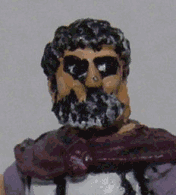 8
out of 9 eh? What do you want me to say? Congratulations for taking a massive
risk with a couple of undergunned infantry units against a massive wall of
cavalry where only risking your own life managed to turn a staggering defeat
into a grafted victory? More like, why didn't you put a legionary unit over
there - they would have been able to hold off the whole army for most of the day
on their own - but no, you are stuck in a totally predictable deployment rut
that forces you to take ridiculous chances with your auxilia almost every
game.
8
out of 9 eh? What do you want me to say? Congratulations for taking a massive
risk with a couple of undergunned infantry units against a massive wall of
cavalry where only risking your own life managed to turn a staggering defeat
into a grafted victory? More like, why didn't you put a legionary unit over
there - they would have been able to hold off the whole army for most of the day
on their own - but no, you are stuck in a totally predictable deployment rut
that forces you to take ridiculous chances with your auxilia almost every
game.
And the legionaries - well, there were hundreds of them facing off against almost nothing for a lot of the game - you had overkill in the wrong areas, and you actually ran the pace of the game totally wrong, committing early where it was 50/50, but struggling to bring the enemy to battle with your best troops until much later.
Lets see how the next game goes then ?
The Ancient Army List Index
The Rise of Rome (280 BC to 25 BC) Mid Republican Roman ; Late Republican Roman ; Gallic ; Pyrrhic ; Later Carthaginian ; Ancient Spanish ; Later Macedonian ; Later Seleucid ; Later Ptolemaic ; Attalid Pergamene ; Numidian or early Moorish ; Pontic ; Early Armenian ; Parthian ; Later Jewish ; Illyrian ; Spartacus Slave Revolt ; Bosporan ;
Storm of Arrows - Western Europe in the Later Middle Ages (1300 AD to 1500 AD) Medieval French ; 100-yrs War English (Continental) ; 100-yrs War English (Britain) ; Later Medieval Scots ( Britain) ; Later Medieval Scots (Continental) ; Later Scots Isles & Highlands ; Medieval Welsh ; Later Anglo-Irish ; Medieval Irish ; Low Countries ; Later Medieval German ; Italian Condotta ; Swiss ; Free Company ; Medieval Burgundian ; Medieval Danish ; Medieval Swedish ; Medieval Castilian ; Medieval Crown of Aragon ; Medieval Portugese ; Later Granadine ; Navarrese ; Ordonnance French ; Wars of the Roses English ; Ordonnance Burgundian ; Santa Hermandad Nueva Castilian
Immortal Fire - The Greek, Persian & Macedonian Wars (550 BC - 146 BC)
Classical Greek ;
Early Achaemenid Persian ;
Lydian ;
Thracian ;
Syracusan ;
Early Carthaginian ;
Skythian or Saka ;
Kyrenean Greek ;
Late Dynastic Egyptian ;
Alexandrian Macedonian ;
Later Achaemenid Persian ;
Classical Indian ;
Early Successor ;
Early Sarmatian ;
Galatian ;
Hellenistic Greek ;
Graeco-Bactrian ;
Graeco-Indian ;
Indo-Greek :
Legions Triumphant - Imperial Rome (25 BC to 493 AD) Dominate Roman ; Principate Roman ; Foederate Roman ; Later Sarmatian ; Early German ; Dacian or Carpi ; Ancient British ; Caledonian ; Early Alan ; Jewish Revolt ; Sassanid Persian ; Kushan or Indo-Skythian ; Palmyran ; Early Frankish, Alamanni, Burgundi, Limigantes, Rugian, Suevi or Turcilingi ; Western Hunnic ; Early Visigothic & Early Vandal ; Early Ostrogothic, Herul, Sciri or Taifali ; Early Anglo-Saxon, Bavarian, Frisian, Old Saxon or Thuringian ; Gepid or Early Lombard ; Early Scots Irish ; Early Pictish ; Hephthalite Hunnic ;
Swords & Scimitars - The Crusades (1096 AD to 1311 AD) Early Crusader ; Later Crusader ; Fatimid Egyptian ; Georgian ; Seljuk Turk ; Cuman ; Komnenan Byzantine ; Post Latin Conquest Byzantine ; Ilkhanid Mongol ; Mamluk Egyptian ; Cilician Armenian ; Syrian States ; Khwarazmian ; Ayyubid Egyptian ; Middle Serbian ; Middle Bulgarian ; Medieval Cypriot ; Latin Greece ; Pecheneg ;
Eternal Empire - Eastern Europe and the Rise of the Ottomans (1300 AD to 1500 AD) Early Ottoman Turkish ; Later Ottoman Turkish ; Tatar ; Later Russian ; Later Serbian Empire ; Later Bulgarian ; Later Lithuanian ; Later Polish ; Later Teutonic Knights ; Catalan Company ; Middle Hungarian ; Moldavian or Wallachian ; Albanian ; Timurid, White Sheep Turcoman or Black Sheep Turcoman ; Later Hungarian ; Hussite ;
Decline & Fall - Byzantium and Islam (493 AD to 1071 AD) Early Byzantine; Maurikian Byzantine ; Thematic Byzantine ; Nikephorian Byzantine ; Later Moorish ; Later Visigothic ; African Vandal ; Italian Ostrogothic ; Early South Slav ; Lombard ; Avar ; Arab Conquest ; Early Bulgar ; Ummayad Arab ; Abbasid Arab ; Early North African Dynasties ; Khurasanian Dynasties ; Bedouin Dynasties ; Dailami Dynasties ; Pecheneg ; Ghaznavid ; Western Turkish (includes Khazar);
Wolves From The Sea - The Hairy European Dark Ages Post Roman British ; Early Welsh ; Later Scots Irish ; Merovingian Frankish ; Later Pictish ; Early Slavic ; Middle Anglo Saxon ; Astur Leonese ; Andalusian ; Early Navarrese ; Carolingian Frankish ; Viking ; Magyar ; Great Moravian ; Early Scots ; Rus ; Norse Irish ; Early Medieval French ; Early Medieval German ; Norman ; Early Polish ; Anglo Danish ;
Swifter Than Eagles - The Biblical Book Nubian ; Early Libyan ; Later Sumerian or Akkadian ; Early Nomad Allies ; Old or Middle Kingdom Egyptian ; Hyksos ; Mitanni ; Syro-Canaanite ; New Kingdom Egyptian ; Later Minoan or Early Mycenaean ; Hittite Empire ; ; Middle or Early Neo-Assyrian ; Later Mycenaean or Trojan ; Sea Peoples ; Philistine ; Phoenician Allies ; Neo-Hittite And Aramaean ; Later Hebrew ; Mannaean Allies ; Libyan Egyptian ; Urartian ; Median ; Neo-Elamite ; Proto-Arab Allies ; Cimmerian or Early Skythian ; Neo-Assyrian Empire ; Phrygian Allies ; Kushite Egyptian ; Neo-Babylonian Empire ;
Oaf of Fealty - Early Medieval Europe Feudal Catalan and Early Crown Of Aragon ; Early Hungarian ; Taifa Andalusian ; Feudal Navarrese and Aragonese ; Feudal Castilian Leonese or Portuguese ; Fanatic Berber ; Italo-Norman ; Feudal French ; Imperial German ; Feudal German ; Communal Italian ; Papal Italian ; Early Scots Isles And Highlands ; Feudal Scots ; Early Russian ; Feudal Polish ; Anglo-Norman ; Later Welsh ; Early Lithuanian or Samogitian ; Wendish Prussian or Estonian ; Early Medieval Frisia and Other Free Cantons ; Post-Viking Scandinavian ; Early Plantagenet English ; Later Sicilian ; Early Medieval Irish ; Early Anglo-Irish ; Early Teutonic Knights ; Mongol Invasion ; Early Granadine ; Middle Plantagenet English ;
Empires of The Dragon - China, Korea and Japan Erlitou-Shang Chinese ; Early Northern Barbarian Allies ; Early Zhou Chinese ; Yayoi Japanese ; Early Horse Nomad ; Ko Choson Korean ; Warring States To Western Han Chinese ; Qiang And Di ; Three Kingdoms Korean ; Eastern Han Chinese? ; Three Kingdoms W Jin And S Dynasties Chinese ; Kofun Nara Japanese ; Northern Dynasties Chinese ; Later Hindu North Indian ; Later Hindu South Indian ; Central Asian City States ; Western Wei To Early Tang Chinese ; ; Later Horse Nomad ; Tibetan ; Nepalese Allies ; Parhae Korean ; Late Tang To Five Dynasties Chinese ; Khmer Or Champa ; Thai Allies ; Nanzhao ; Pyu Burmese Allies ; Koryo Korean ; Early Heian Japanese ; Pagan Burmese ; Liao ; Song Chinese ; Xi Xia ; Ghurid Afghan ; Jin ; Late Heian To Muromachi Japanese ; Japanese Warrior Monk Allies ; Mongol Conquest ; Moslem Indian Sultanates ; Medieval Indonesian Or Malay ; Yuan Chinese ; Medieval Burmese ; Ming Chinese ; Yi Korean
Blood and Gold - The Americas Olmec ; Teotihuacan ; West Mexican ; Zapotec or Mixtec ; Toltec ; Chinantec ; Aztec ; Tarascan ; Tlaxcalan Confederacy ; Mayan ; Mochica ; Chanca ; Chimu ; Hatun-Colla ; Canari ; Inca ; Mapuche or Araucanian ; Amazonian Forest Tribes ; Tupi ; Chichimec ; Pueblo Culture ; Mound-Builder Culture ; South-Eastern Woodland Culture ; Timucuan ; Eastern Woodland Culture ; Plains Culture ; Pacific North-West Culture
View My Stats for My FoG Pages
